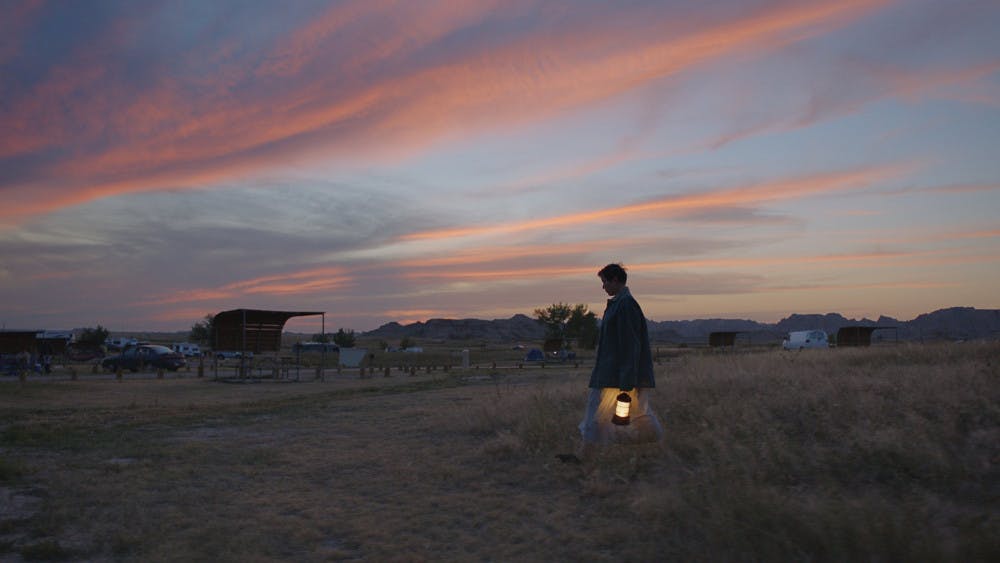Written and directed by Chloé Zhao, “Nomadland'' is a simultaneously intimate and effusive meditation on the stratum of unsettled Americans. These nomads are often flippantly deemed the outcome of some sort of failure, be it economic dissolution or domestic upheaval. Zhao’s film challenges this broad encapsulation by delving into the stories of grief and loss, and exploring the meandering journey of healing through which resilience and compassion are found.
Based on Jessica Bruder’s nonfiction book Nomadland: Surviving America in the 21st Century, Zhao’s “Nomadland” is an inventive adaptation that blends documentary and fiction. Fern, the lead character (played by a magnificent Frances McDormand), is surrounded by memorable non-professionals playing themselves — gray-haired van travelers who constitute Bruder’s book and now share their stories on the silver screen.
Many of these people suffered the brunt of the Great Recession. Now, they find themselves jobless after decades of work and yet cannot afford to retire with meager Social Security benefits. (550 dollars, Linda May tells Fern. That’s all she gets after working all her life since the age of twelve.) The result is a nomadic lifestyle where costs of living are reduced to the maintenance of a camper van. Traversing America, they look for seasonal work at restaurants, malls and factories.
Zhao’s film begins by taking us inside an Amazon warehouse in Nevada, where grim-faced, ant-like workers are lined up against towering machinery. For once, we learn more about the anonymous faces that pack our Prime boxes as distinct individuals. During lunch, the workers introduce themselves, and a colleague shows Fern a tattooed quote on her arm that reverberates throughout the remainder of the film: “Home, is it just a word? Or is it something you carry within you?”
For Fern, home is her van, where the interior has been decorated with string lights and remodeled for increased storage space. When she rejects a mechanic’s recommendation to buy a new vehicle in lieu of undertaking costly repairs, she has to explain and defend her idea of home. On one occasion, she encounters one of the students she used to tutor. The girl asks her if she is homeless. “I’m not homeless; I’m just houseless,” Fern corrects her.
When a few friends and her sister ask her to stay and live with them, Fern declines repeatedly. Despite the stillness of her weathered face and the easygoing smiles for new friends, there is a restlessness in Fern that pushes against societal norms that constitute an ordinary life.
When her husband passed away and the mining town of Empire that she once called home was struck from the map, Fern found herself unmoored from the structures of her life, destabilized and lost. Even when Fern finally packs up her valued possessions and drives away from what was once Empire, her sadness and loss are not left behind. There is a sense that she will not be able to settle down again, at least, not for a very long time.
The film’s understanding of this elevates its storytelling from hackneyed melodrama, as it masterfully evades siloing Fern within the conventional self-redemptive character arc. Blending seamlessly in with the real-life community of nomads, she asks about the lives of her companions, how they discovered the nomadic life, whether they have something permanent to return to. She herself shares memories about her husband Beau, remnants of her past life she held dearly. Beau loved Empire, she tells them.
Cinematography plays a key role in the construction of ambience and narrative. Zhao reunites with Joshua James Richards, the cinematographer behind her 2017 film “The Rider,” capturing the sweeping beauty of the American landscape. As the camera glides behind Fern’s white camper van, along winding roads set in empty desert terrain fringed with distant mountains, the film shows the spacious American West and the mobile community that embraces their immersion with nature.
Fern’s solitary figure is beautifully depicted, an outline of a worn oversized denim jacket against glorious gold-hued sunsets and the glacial striations of the American West. Her loneliness and strength in the remembrance of all the things she had lost become poignantly illustrated.
Winning the 2021 Golden Globe Awards for best drama and best director, “Nomadland” is both heartbreaking and spiritually affirming. Like Fern and many of her nomad friends, people inevitably encounter overwhelming sorrow and uncertainty throughout life. But, as Fern’s story illustrates, loss yields a new journey, one bright with the prospects of recovery.

ADVERTISEMENT




